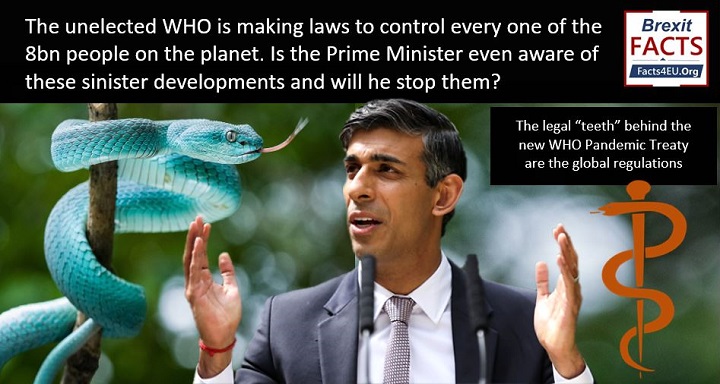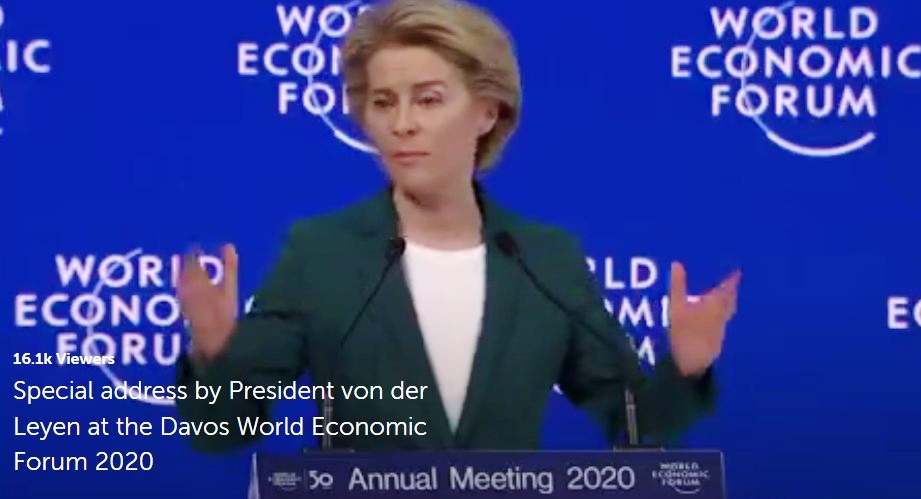The unelected WHO is making laws to control every one of the 8bn people on the planet
Unelected world delegates will decide whether you are locked down or not
Montage © Facts4EU.Org 2023
Is the Prime Minister even aware of these sinister developments and will he stop them?
In Part IV of this series we looked at the proposed new WHO Pandemic Treaty or ‘Agreement’. Today in Part V we review the WHO’s ‘International Health Regulations’ which will control the activities and freedoms of every single one of the eight billion people on the planet.
A Brexit Facts4EU.Org and CIBUK.Org Series
Part One – Executive Summary
Part Two - What is the WHO? Who funds and controls them?
Part Three – Future pandemics and how the WHO will dictate lockdowns and removal of personal freedoms
Part Four - What the WHO pandemic Treaty will do specifically - and how this will affect you - The Treaty
Part Five - The new International Health Regulations - and how they will affect you further (This report)
Part Six - How the unelected WHO will take decisions overruling the UK Government
Part Seven - A Facts4EU one-page bulleted summary and conclusions
What follows is an examination of some of the more sinister elements of these new Regulations, summarised by Philippa D’Arcy and the Facts4EU.Org team.
The legal “teeth” behind the new WHO Pandemic Treaty are the global regulations
The real supranational powers behind the proposed new Pandemic Treaty come in the form of amendments to the ‘International Health Regulations’.
The clue is in the word ‘Regulations’. These will soon become legally binding on the British Government unless it acts quickly.
Who is deciding all these global ‘Regulations’?
In December 2021, the World Health Assembly established an ‘Intergovernmental Negotiating Body’ (INB) to draft and negotiate a convention, agreement or other international instrument under the Constitution of the World Health Organization “to strengthen pandemic prevention, preparedness and response.”
This might sound boring and innocuous, but it is not. These Regulations will affect us all, unless stopped.
The process of the WHO deliberations and the time-scale
© WHO 2023 - click to enlarge
On Monday (06 November 2023) the seventh meeting of the INB began. It runs until 10 November and resumes over 04-06 December 2023.
This is a totally separate legal instrument to the Pandemic Treaty. The International Health Regulations are negotiated at the ‘World Health Assembly’ by unelected delegates. They already passed five proposed amendments in May 2022, and they are currently negotiating 307 more which they propose adopting by May 2024.
All amendments will be accepted/passed if a simple majority (50%) of countries’ representatives vote yes. There has been no national or international public comment or vote sought as part of the negotiation process. It seems that the public aren’t considered to be relevant stakeholders in the negotiations that takes place at the WHA.
The International Health Regulations do not need to ratified by Parliament to become law
The previous version of the IHR was agreed in 2005. Unlike the proposed Pandemic Treaty which must be scrutinised by Parliament before being ratified by Government, the IHR 2005 is already an instrument of international law which is legally binding on 194 countries.
Any new, adopted amendments will require no UK parliamentary scrutiny or vote, so this is the more dangerous legal instrument. The WHO has already stated its intention to use the IHRs to strengthen their control over future pandemic policy, because they are already legally binding and there is no need for ratification by any parliament around the world.
Dr Abdullah Asiri of Saudi Arabia (pictured right), Co-Chair of IHR Amendments Working Group, spoke in the World Health Assembly IHR working group meeting in May 2023. He gave a three-minute chilling speech outlining their goals. He commented that the implementation of IHRs had been problematic to-date, so enhancements are required.
“The world requires a different level of legal mandates, prioritising actions that may restrict individual liberties, mandating the sharing of information, knowledge and resources and providing funds for control efforts.”

The amendments to the International Health Regulations have already started
The amendments to the IHR have already started and are about to becoming binding in International law. In particular five amendments were submitted on 24 May 2022 by 10 member states. They were adopted just three days later on 27 May 2022 without any opportunity for public discussion, debate or comment. It is unclear whether the UK delegates even informed our elected representatives of the ramifications of their actions. It is equally unclear whether the Prime Minister was aware of the existence of these amendments and the authority that we have to reject them.
There is one amendment from this set of five amendments that we unequivocally need to reject - Article 59 - and we comment on this urgent action in 'Obervations' below.
We are currently 17 months into the 18 month period ending Dec 1st 2023, during which the UK government has the right to reject to any of the amendments adopted in 2022. To reject an amendment the government has to invoke Article 61 of existing IHRs before the deadline passes. If the deadline passes, these amendments will become binding under international law, and there is nothing that the government can do about it. The deadline to opt out of this is 30 November 2023.
Brexit Facts4EU.Org Summary
The deadly effect of the new International Health Regulations on sovereignty and freedoms
Consequences of the 307 amendments proposed in May 2023, currently being debated:
1. Change the recommendations of the IHR from ‘non-binding’ to binding instructions that the States undertake to follow and implement. This means the WHO will now direct not recommend.
2. Expand the definitions of pandemics and health emergencies, including the introduction of ‘potential’ for harm rather than actual harm.
3. Solidify the WHO Director General’s ability independently yo declare emergencies. He will have sole authority to declare a pandemic or even a potential pandemic, at which point all decision-making powers fall under the WHO. There are no standards that must be met before a public health emergency can be declared – he can act on suspicion, and more disturbing, the treaty will be in force all the time, so he doesn’t actually need to declare an emergency. He will have the authority to dictate public health even when there is no pandemic.
4. These two points together would result in an unelected, unaccountable individual having unprecedented levels of completely unfettered power, who could dictate UK public health policy and restrict fundamental freedoms and human rights with no recourse.
5. Set up an extensive surveillance process in all States, which the WHO will verify regularly through a country review mechanism to identify potential pathogens with pandemic potential. This will include swabbing and testing humans, domesticated animals, farm animals, wildlife, farms, factories, wastewater and more. The chances of finding a pathogen with pandemic potential if searching for it in every nook and cranny of the world are 100%. Every two years they will inspect the country, and the country will be told where it needs to shape up. There is a large division funded by billions of taxpayers’ money being put in place to handle this.
6. Enable the WHO to share country data without consent.
7. Remove the clause relating to individual sovereignty which until now has required the WHO to uphold “full respect for the dignity, human rights and fundamental freedoms of individuals”.
8. Give the WHO control over certain country resources, including requirements for financial contributions, and provision of intellectual property and know-how.
9. Formalise the creation and implementation of a globally interlinked health certification system, that would be recognised by all WHO member states, and which would enable nations to enforce travel restrictions with vaccine certificates, prophylaxis certificates, passenger locator forms, health declarations, all tied to a personal QR code.
10. Mandate systematic global collaboration to counter any dissent to any official government or WHO guidance. The amendments will ensure national support for promotion of censorship activities by WHO to prevent contrary approaches and concerns from being freely disseminated, i.e. censorship of all dissenting voices. The WHO’s narrative will be the only one allowed. YouTube has already implemented this policy even though the treaty is not yet in place.
11. Change existing IHR provisions affecting individuals from non-binding to binding, including border closures, travel restrictions, confinement (quarantine), medical examinations and medication of individuals.
12. Binding provisions affecting individuals could therefore encompass requirements for injection with vaccines or other pharmaceuticals. This means vaccines could be mandatory.
13. Article 8 also provides for provisions to accelerate vaccine development, approvals and licensing for emergency use – undercutting regulatory oversight developed over decades, and safety trials, thus greatly reducing costs to pharma manufacturers.
14. It will enable the WHO to decide which medications can be used in medical emergencies, and which can’t. The DG will decide health care for every person in every member state, and local doctors will be required to follow his edict.
An adoption of these amendments, along with ratification of a new Pandemic Treaty, would result in highly significant change to global public health governance, permanently undermining and even removing national sovereignty in a health emergency, handing it over to the WHO and potentially to their sponsors and funders.
The role of the worldly and wealthy rich
It is important to consider these texts together, and in the context of the wider pandemic preparedness agenda that includes agencies such as Gavi and CEPI, their private and corporate sponsors and private industry lobby groups including the World Economic Forum (WEF).
EU Commission President Ursula von der Leyen, © WEF - click to enlarge
The WEF has been influential in promoting the agenda. CEPI was inaugurated at the 2017 WEF meeting in Davos. The pandemic agenda must also be seen in the context of the unprecedented profits and wealth transfers. It must also be seen in the context of the suspension of basic human rights that the Covid-19 public health response promoted.
Observations
One Article needs to be rejected now
Article 59 halves the time that countries can object to/reject an amendment, from 24 months to 12 months from the World Health Assembly vote. After this, the amendment would then enter into force. This speeding up of the process would impede the normal democratic process, because it would introduce a considerable time restriction for lobbying groups in nation states to raise awareness and apply political pressure and would increase the chances of undesirable amendments from slipping through, unnoticed by public or politicians.
The deadline for the UK Government to reject this Amendment is 30 November 2023 - in just three weeks' time.
We must get reports like this out there
Reports like the one above take far longer to research, write and produce than many people realise. If they were easy, readers would see other organisations also producing these daily. However, there’s little point in the Facts4EU.Org team working long hours, seven days-a-week, if we lack the resources to promote them effectively – to the public, to MPs, and to the media. This is where you come in, dear reader.
Facts4EU.Org needs you today
We are a 'not for profit' team (we make a loss) and any payment goes towards the actual work, not plush London offices, lunch or taxi expenses, or other luxuries of some organisations.
We badly need more of our thousands of readers to become members, to support this work. Could this be you, today? It's quick and easy, we give you a choice of two highly secure payment providers, and we do NOT ask you for further support if you pay once. We just hope you keep supporting us. Your membership stays anonymous unless you tell us otherwise.
Please don't assume that other people will keep us going - we don't receive enough to survive and we need your help today. Could you help us? We rely 100% on public contributions from readers like you.
If you believe in a fully-free, independent, and sovereign United Kingdom, please join now by clicking on one of the links below or you can use our Support page here. You will receive a personal, friendly ‘thank you’ from a member of our team within 48 hours. Thank you.
[ Sources: WHO ] Politicians and journalists can contact us for details, as ever.
Brexit Facts4EU.Org, Thurs 09 Nov 2023
Click here to go to our news headlines
Please scroll down to COMMENT on the above article.
And don't forget to actually post your message after you have previewed it!
Since before the EU Referendum, Brexit Facts4EU.Org
has been the most prolific researcher and publisher of Brexit facts in the world.
Supported by MPs, MEPs, & other groups, our work has impact.
We think facts matter. Please donate today, so that we can continue to ensure a clean Brexit is finally delivered.
Paypal Users Only - Choose amount first
Quick One-off
Monthly





Something to say about this? Scroll down for reader comments